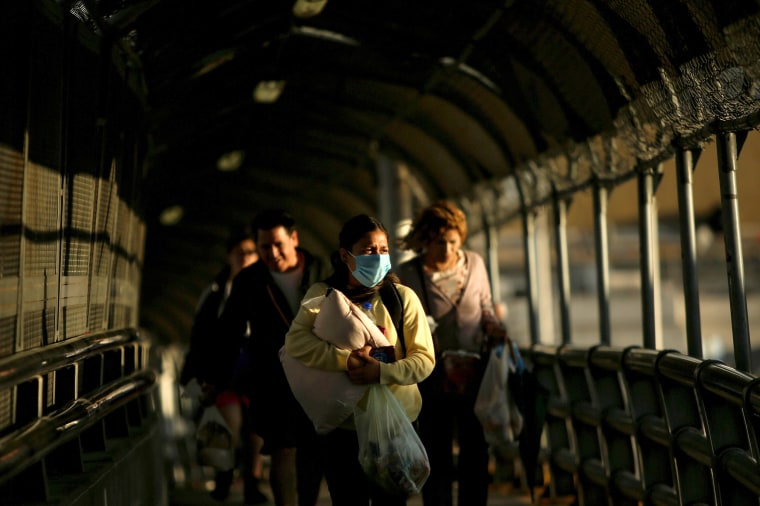Asked by reporters Tuesday if he would be shutting the land borders to the U.S. because of coronavirus, President Donald Trump said he did not want to shut them, but was "discussing" the issue with Mexico and Canada.
A senior administration official told NBC News the administration has already explored the possibility of new restrictions on the southern U.S. border, because of fears that once the virus hits Central American countries like Honduras, Guatemala and El Salvador, citizens of those countries will begin to travel to the U.S. border in large numbers to try to access the U.S. healthcare system.
One option under consideration, said the official, is invoking 42 USC 265, a portion of the federal legal code that says the U.S. surgeon general “shall have the power to prohibit, in whole or in part, the introduction of persons and property from such countries or places as he shall designate in order to avert such danger, and for such period of time as he may deem necessary for such purpose.”
The restrictions would apply to both the northern and southern borders, said the senior official, and the statute has never been used before.
The policy under discussion would empower Border Patrol officers to apprehend migrants between ports of entry and return them to Mexico without processing, according to an administration official. The goal is to minimize the health risks to Border Patrol officers, as well as other immigrants that are being held in detention centers.
A decision on the new policy is expected within the next 48 hours, said the official. The official stressed the proposal would not affect legal commercial trade and would not apply to anyone with a work permit.
If families with coronavirus were to come across the border, a former senior DHS official who did not want to be named said the current facilities are not designed to accommodate them. “Border Patrol stations are super confined spaces and are designed for adult males,” said the former official.
NBC News has previously reported on poor health-care conditions for immigrants in Border Patrol facilities along the southern border. In 2019, multiple children in detention died from flu-like symptoms.
Currently, U.S. Border Patrol agents or CBP officers who encounter immigrants exhibiting flu-like symptoms are directed to refer the immigrants to “the CDC or local health officials for enhanced health screening,” according to a CBP spokesperson.
“Additionally," said the spokesperson, "all persons in U.S. Border Patrol custody who meet the CDC’s COVID-19 travel history and enhanced screening guidelines are being referred to CDC for additional screening.”
A spokesperson for the Department of Homeland Security referred all questions about the possibility of shutting down the border to the White House.
The former senior DHS official told NBC News that another option might be to shut down all pedestrian and car traffic across the southern border, but leave the border open to cargo.
A remaining question would be how a border closure would impact the “Remain in Mexico” policy that requires Mexican cooperation to allow those who are seeking asylum into the United States to wait in Mexico until the date of their asylum proceedings. That policy has been repeatedly challenged in federal court.
Six days ago the Supreme Court allowed the Trump administration to continue the policy while the court decides whether or not to hear an appeal of a lower court ruling that declared the program illegal.
The latest updates from Mexico’s health minister show the country has 82 confirmed cases of coronavirus and no fatalities.
